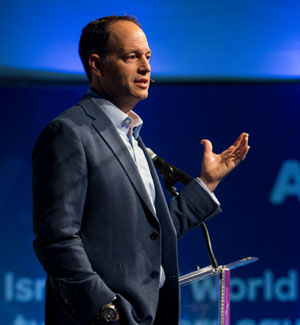By Zack Bodner
Think about the Jews you know— both in the Diaspora and in Israel.
Now, among them, do you know a Diaspora Jew whose relationship with Israel has become tainted by Israel’s politics or policy decisions—specifically Israel’s treatment of the Palestinians or non-Orthodox Jews?
What about an Israeli who couldn’t care less about what Diaspora Jews think because they are certain Diaspora Jews will be gone in a generation due to intermarriage and assimilation?
I’m going to go out on a limb and assume you know someone who fits each description.
And that’s the problem.
Today, Jews in Israel and the Diaspora are speaking past each other. We are focused on the areas of disagreement, misalignment, and frustration. Each of us is unwilling to accept the other if they don’t share our opinions on politics or identity. We are willing to disassociate ourselves from the entire body politic of the other simply because we don’t see eye to eye.
But when have the Jews ever agreed with each other?
Did Joseph and his brothers get along? Did the Sadducees and Pharisees agree? Did the Maccabees embrace the Hellenized Jews? Did the students of Hillel and Shammai light Hanukkah candles together? Did the soldiers of the Haganah lay down their guns when facing Irgun soldiers?
In case you were wondering, the answer is “No!” Jews have always had deep disagreements, yet we have not only managed to survive as a people, but we have woven those divergent strands deep into our shared identity.
That’s why it’s time to reimagine Diaspora-Israel relations. It’s time for Jewish peoplehood to grow up. It’s time for Zionism to evolve into its next phase: Zionism 3.0.
Why 3.0? Because Zionism 1.0 was the pre-1948 Zionism of theory, the pioneers, Theodor Herzl, Ahad Ha’am, and Rav Kook. It was the Zionism of creating a sovereign Jewish State where Jews could be safe and live without fear of pogroms or Nazis.
Then in 1948, Zionism evolved into its next phase. Zionism 2.0 was the Zionism of reality and the builders, including Ben Gurion and A.D. Gordon. Israel’s existence was threatened by its neighbors and a vital piece of its survival was Diaspora support. Zionism 2.0 was defined by the “rich American uncle”—the notion that those in the Diaspora who didn’t make aliyah were obligated to support those who did. It was the Zionism of Diaspora negation; the thinking that the Jewish future lies only in Israel, and those in the Diaspora were somehow lesser Jews.
But now, for the first time ever in Jewish history, we have two strong, independent, thriving centers of Jewish life: in Israel and in the West, primarily in North America. We have different characteristics, but we are both flourishing. And now we depend on each other in new ways and can enrich each other in new ways. So the model must evolve into Zionism 3.0, the next phase of Zionist ideology.
We must recognize that Jews in both places add to the other—not just for security, but with each other’s spiritual and cultural contributions as well. We can’t let political frameworks dictate the nature of our relationship but must use our shared sense of peoplehood and our common destiny to frame our relationship.
The Z3 Project strives to do just that by embracing three central principles:
-
- Unity not uniformity: we aim to honor our differences while working for the oneness of the Jewish people.
- Engaging as equal partners: we bring together Israelis and Diaspora Jews to build our common future.
- Diversity of voices: we convene Zionists of differing backgrounds and perspectives across political and religious spectrums.
For the last six years at the Oshman Family JCC in Palo Alto, California, we’ve hosted a full-day conference that’s attracted more than 1,000 people at a time to engage in this conversation. This year, we are making the experience available to people all over the world by moving to a 100% virtual experience during the week of Hanukah and inviting JCCs around the globe to participate.
This innovative, online experiment is so much more than a web conference. Thanks to the partnership of JCC Association of North America and JCC Global, more than 30 JCCs will bring Z3 to their own communities. Each day during Hanukkah, we will have a few hours of programming that starts with a marquee speaker followed by a panel of experts. Throughout the program, we will stream articles and videos rich in information about the topic under discussion and poll participants to probe their thinking. Then, each community will breakout to host its own local discussion. Most exciting of all, the week will culminate with every attendee casting a vote to determine which deserving non-profits will receive support from the pooled fund created by the registration fees. It will be the world’s largest Jewish giving circle!
This conference is an exercise in active participation. We are done with passive teleconference calls where we only watch interesting speakers. The Z3 Project and all who participate this year are demonstrating a deep commitment to work collectively to move Zionism and peoplehood to the next level.
Help us reimagine Diaspora-Israel relations together by joining us at www.Z3Project.org, where you’ll not only have an opportunity to hear from an impressive lineup of great speakers, but also to share your own thoughts and ideas about Diaspora-Israel relations.
This essay originally appeared in J. The Jewish News of Northern California.
 Zack Bodner is the CEO of the Oshman Family JCC in Palo Alto, California, that initiated an annual conference, Zionism 3.0, that became The Z3 Project, a global effort to reimagine Diaspora-Israel relations. Previously, was the Pacific Northwest regional director for AIPAC.
Zack Bodner is the CEO of the Oshman Family JCC in Palo Alto, California, that initiated an annual conference, Zionism 3.0, that became The Z3 Project, a global effort to reimagine Diaspora-Israel relations. Previously, was the Pacific Northwest regional director for AIPAC.